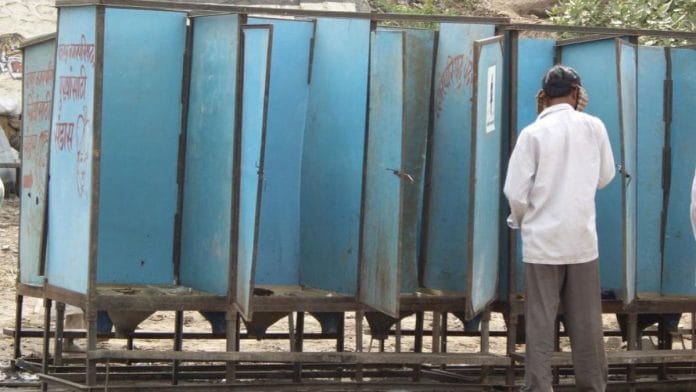New Delhi: Delhi continues to have inadequate sanitation infrastructure despite achieving ODF ++ status (open defecation free with additional cleanliness parameters), with one toilet seat serving 9,767 male and 10,343 female users in the city, a report released by the Praja Foundation Thursday said.
The Swachh Bharat Mission (SBM), the NDA government’s flagship programme to make urban and rural areas clean and ODF, prescribes one toilet seat per 100-400 for men and 100-200 for women.
The Praja Foundation report on the status of civic issues in Delhi also pointed out that an additional 40,521 toilet seats are needed to fully comply with SBM norms for community toilets as of 2023.
The voluntary organisation, which works in the sphere of civic governance, also highlighted how approximately 28 percent of public toilets in Delhi lack water supply, and 7 percent are unusable due to the absence of electricity.
The report delves deep into the core issues plaguing the city, focusing primarily on water supply, sanitation, and pollution levels, all of which significantly impact the daily lives of its residents.
In a statement, Milind Mhaske, CEO of Praja Foundation, said that the findings are reflective of the fact that the government has not been successful in the management of civic issues.
“It is high time, the state government initiates steps to effectively manage Delhi’s civic issues in a citizen-engaging manner,” he said.
Also read: Pressured by builders or for public good? Haryana reversing ban on stilt+4 buildings raises concerns
Public dissatisfaction with civic services
The Praja Foundation found a massive spike in the public’s dissatisfaction with civic services between 2019 to 2023. Issues related to solid waste management have seen a 141 percent increase followed closely by those related to sewerage (120 percent) and water supply (66 percent).
Water-related issues have surged dramatically in the city over the past few years, with an alarming 950 percent increase in grievances raised in the Delhi Legislative Assembly from 2019 to 2023, the report states.
The prescribed standards for water quality, such as Biological Oxygen Demand (BOD) and Fecal Coliform levels, paint a grim picture. Data reveals shocking discrepancies — BOD levels at sewage outlets into the Yamuna River are reported at 21 mg/litre, a staggering 700 percent higher than the permissible limit of 3 mg/litre.
Even more concerning are the Fecal Coliform levels, exceeding safe limits by over 30,000 percent, posing severe health risks to Delhi’s populace.
Nitai Mehta, the founder of Praja Foundation, emphasised the severity of the situation and, in a statement, said: “Water-related complaints have consistently been the highest among all civic complaints between 2019 to 2023. In 2023, more than 1,93,938 public complaints were raised about the water supply, a sharp uptick by 66 percent from 2019.”
The report also talks about Delhi’s air pollution crisis, with not a single month in the five years up to 2023 recording ‘Good’ air quality levels while having satisfactory levels recorded only in July, August and September, moving in line with monsoon.
Despite the mounting discontent among the public, legislative engagement on these critical matters remains inadequate, the report states. The delayed formation of Ward Committees, mandated to address localised civic issues, exacerbates this disconnect between citizens and governance structures.
With only six out of 12 zones of the Municipal Corporation of Delhi maintaining adequate data on public and community toilets, there is an urgent need for comprehensive reform to bridge these administrative gaps and ensure effective service delivery.
The report serves as a call for immediate and concerted action by Delhi’s government and civic authorities. Both Mehta and Mhaske emphasised the need for citizen-centric governance reforms to tackle these entrenched challenges effectively.
(Edited by Zinnia Ray Chaudhuri)






